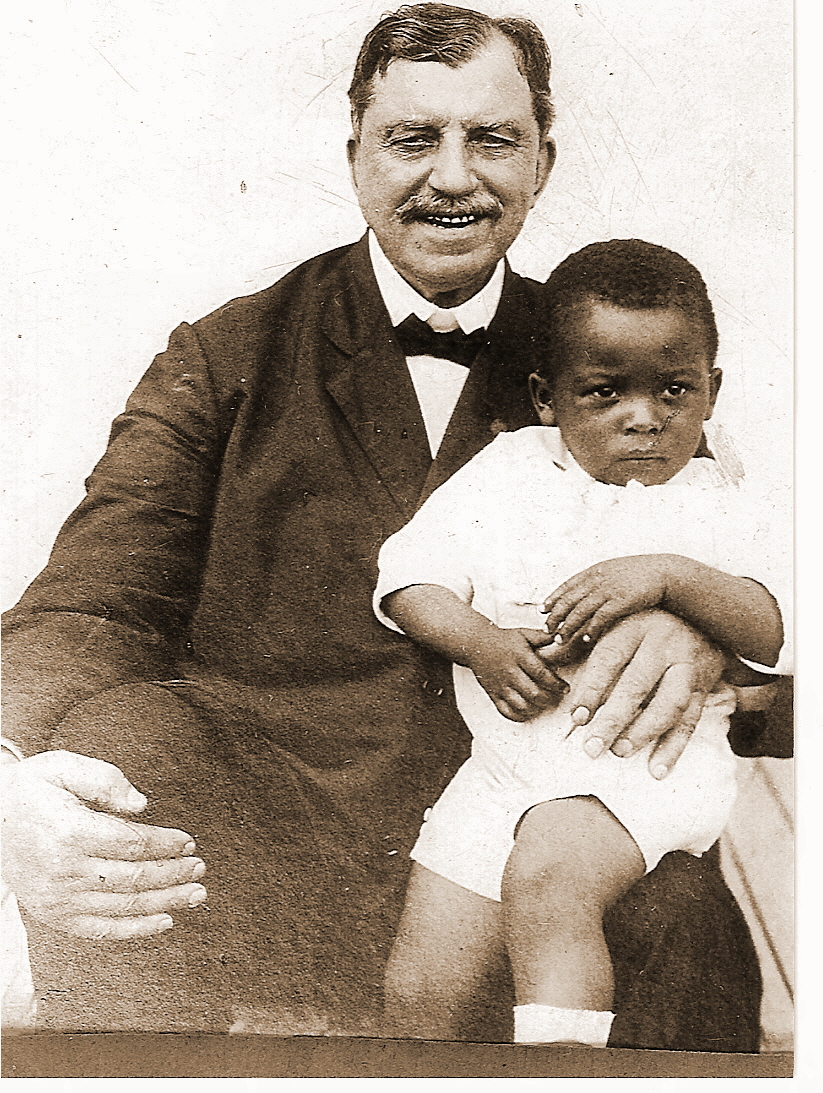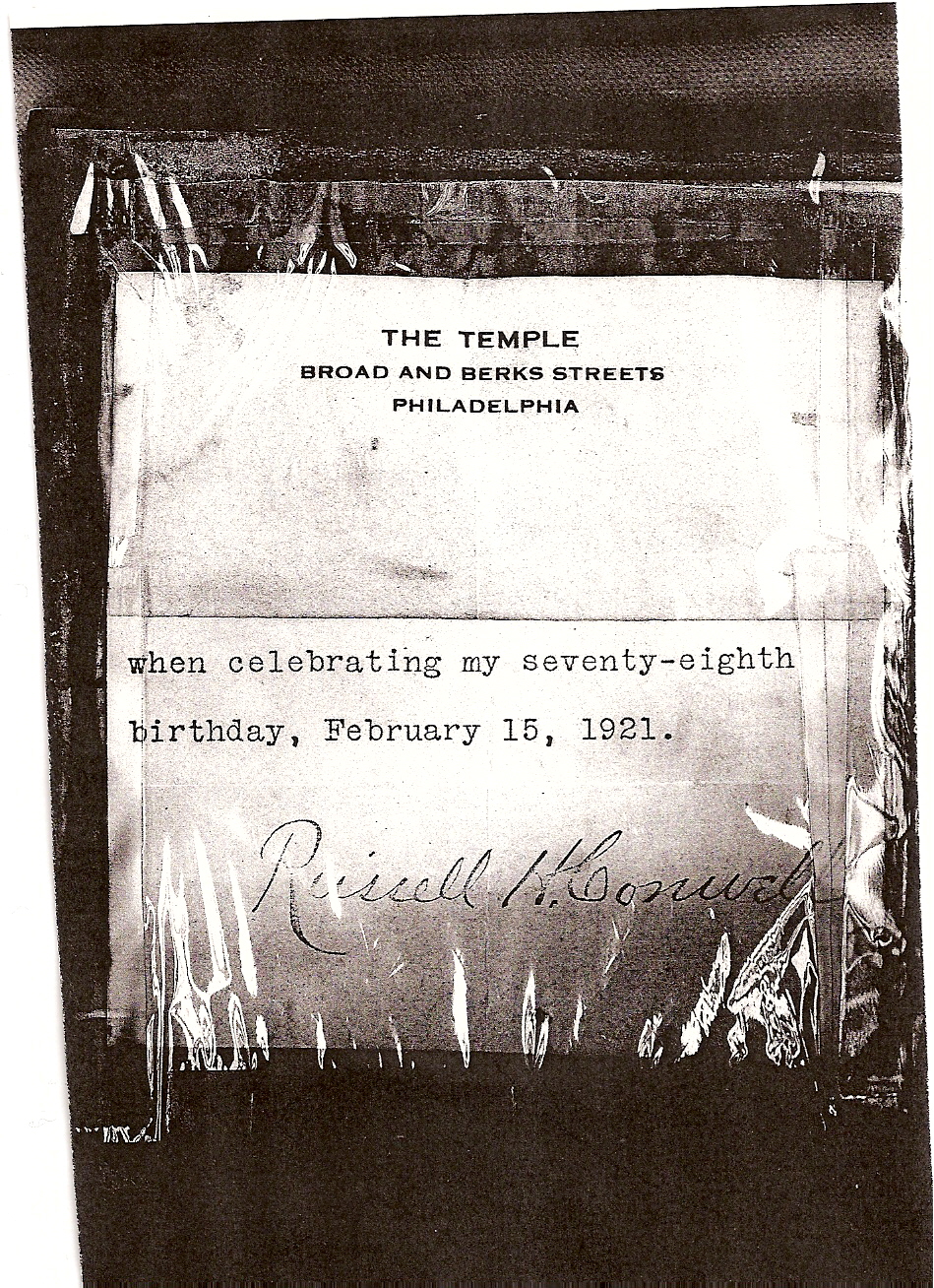This Week's SermonSee Home Page for this week's sermon This WEEK AT gbcbb
|
Conwell Founds Temple University and Temple HospitalNot only was a college of prime concern to the church, but so was the need for a hospital. In September of 1891, there was a resolution “that we unanimously recommend the establishment of a Baptist hospital.”
Having been a military person, Dr. Conwell decided to use the military as a means of working with youth. A Temple Guard was formed in 1890 for young boys, with its first encampment in July of 1892. The Philadelphia Bulletin printed the following:
The Temple
Guard is an independent military company of young men between the ages of
eighteen and twenty-two years, with headquarters at Columbia Hall, 1325 Columbia
Ave. The Temple Guard was an idea of the Rev. Russell H. Conwell, who organized
it in 1890 at the Baptist Temple, Broad and Berks Sts., where the company
remained until a couple of months ago, but owing to some friction with the
trustees of the church, the young men sought other quarters. In drilling the
guard soon gained perfection, as twenty-two victories over as many companies
will attest. The company has also appeared at 211 public functions, covering
three States, twenty-four towns, twice in New York City. Although military
science has occupied a great part of the company’s attention, patriotic
demonstrations have added materially to the fame of the Temple Guard. Fifteen
hundred dollars were raised at three great Cuban demonstrations at the Temple
and at the Academy of Music, which money was given for the relief of suffering
Cuban reconcentrados. The Temple Guard was the first American association to
place flowers on the graves of the dead of the U.S. Maine at Havana, this act
being done by their president, Dr. Frank Lambader, who was in Cuba at the time
distributing funds raised by popular subscription. Receptions have been given
to honor Mrs. Henry Ward Beecher (her only visit to Philadelphia), General Julio
Sanguilly, the hero of the Ten Years’ War, Miss Evangeline Cisneros, who escaped
from Recojidas Fortress, and the People’s Sword presented by the people of
Pennsylvania, was given to Admiral Schley under the auspices of the Guard, who
served as guard of honor and whose guest he was at the Temple. The company is
armed and equipped and meets for drill each Thursday night. During the summer a
military camp is held for two weeks; former outings being at Ogontz, Jenkintown,
Neshaminy Falls, Stone Harbor, Delaware Water Gap, twice, Point Pleasant and
twice at Sanatoga Park. The aims of the Guard are both military and social.
The armory and reading-room are open every day and evening excepting Sunday,
where full information can be secured from the guardsmen on duty. By 1895, Mr. Conwell had baptized nearly 3,000 persons. When the invitation to accept Christ or join the church was given, it was not unusual for seven persons to respond. When this fact became known, the pastor would seek the seven and if there were more he would then seek a multiple of seven. Although there were no revival services, large groups of people responded.
When asked by a reporter for the
secret of the Temple where the congregation increased to An unusual method of the selection of deacons occurred for many years. Names were placed in a bowl and a member was asked to pick out seven names. With the names in hand, the Church Clerk was instructed to declare the seven people elected as deacons. This practice continued until 1927. Crowds desiring to hear the pastor were so large that an overflow meeting was held in the college as the regular service continued in the Temple. One might surmise that such a strong leader as Dr. Conwell could have his own way in all matters, but this was far from the truth. Records show that on one occasion, for example, he desired a leave of absence to continue his lecturing. The congregation, knowing that the attendance would suffer if the pastor were absent and furthermore that the pastor needed rest from his duties, voted to disallow his absence. On the occasion of his fiftieth birthday, he told of being asked a question and his answer: I met a man, a few days ago, on a railway train in Massachusetts. He said to me, “I would like to know how you ever expect to build the college, and enlarge the hospital, and found an orphanage and a young ladies’ home, and all these things of which I have read.” I said, “I don’t expect to do it.” “Are you going to give it up?” “No. We will have the Young Women’s Home and the Orphanage.” “Well, what do you mean by that? You say you don’t expect to do it, yet you are not going to give it up, and you expect to have it?” I said, when the church gets ready to go on with it, it will go; not when I get ready, for I am ready now. Indeed we do need a better home for our college; our hospital should be extended until the great Baptist denomination which we represent shall have a place for the sick, until thousands instead of hundreds shall have the advantage of a home for the maimed, the sick, and the suffering; and I believe that is yet to come. That will grow out under God’s leadership for purposes of greater philanthropic work when we have passed into eternity. I am ready for it now. When the church is ready, it will come, and I am willing to wait until the judgment of our people shall say, “The time is come.” How could such a growing church maintain a continued interest of the members other than their listening to the pastor’s sermons each Sunday? The following organizations might be overwhelming to readers today, but the membership was divided into separate groups, many of them with well over one hundred members.
The work of the Temple extended far from its doors. Other missions (some to become churches) included Logan Grace, Clearfield Street, Rising Sun, Tioga, Mayfair and West Oak Lane. Dr. Conwell was a prolific writer. His books included:
Dr. Conwell was probably best known around the country and the world as a lecturer. Before arriving in Philadelphia,, he was a successful lecturer. The church gave him opportunities toward this pursuit. Millions of dollars were received from his speeches, but records show that all monies except expenses were given to deserving college students, the church, college or hospital. His lectures included: “The Philosophy of History” “The Old and New New England” “The Dust of Our Battlefields” “Was it a Ghost Story?” “Three Scenes in Babylon” “Americans in Europe” “General Grant’s Empire” “Guides” “Acres of Diamonds” “The Silver Crown or Born a King” “The Jolly Earthquake” “Garibaldi or the Power of Blind Faith” “The Angel’s Lily” “The Seven Guardian Angels of Columbus” “Five Million Dollars for the Face of the Moon” “Henry Ward Beecher” “Cuba’s Appeal to the United States” “Men of the Mountains” “My Fallen Comrades” “The Unfortunate Chinese”
“Three
Scenes from the Mount of Olives”
|

 The hospital began in humble
circumstances. A doctor and nurse were on call in two houses: one for patients,
opened on January 30, 1892, and a second for mothers and babies. The name
“Samaritan” was chosen. Soon after, the Garretson Hospital was established. A
maternity hospital was also started and called the “Greatheart”. Later these
three hospitals were joined under one name—Temple University Hospital.
The hospital began in humble
circumstances. A doctor and nurse were on call in two houses: one for patients,
opened on January 30, 1892, and a second for mothers and babies. The name
“Samaritan” was chosen. Soon after, the Garretson Hospital was established. A
maternity hospital was also started and called the “Greatheart”. Later these
three hospitals were joined under one name—Temple University Hospital. 

 nearly 1,700, built a
church, founded a college and opened a hospital, the Associate Pastor, Dr.
George A. Peltz responded quickly, “Sanctified common sense.”
nearly 1,700, built a
church, founded a college and opened a hospital, the Associate Pastor, Dr.
George A. Peltz responded quickly, “Sanctified common sense.” 
